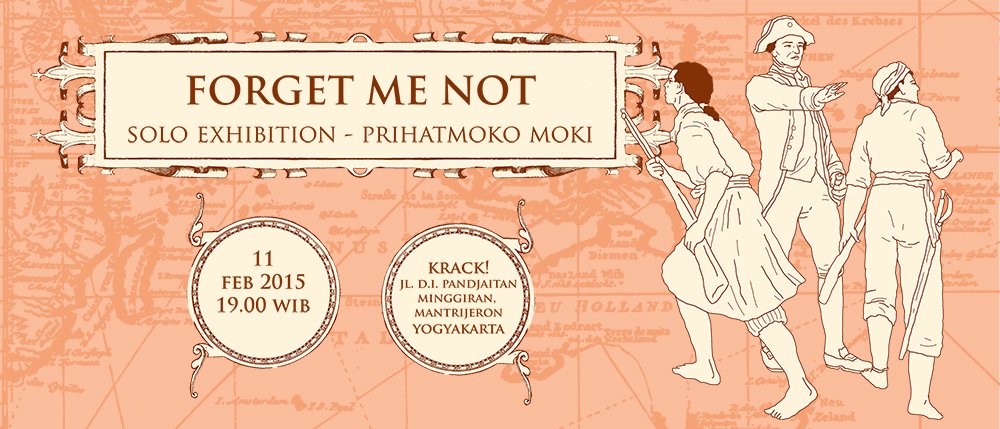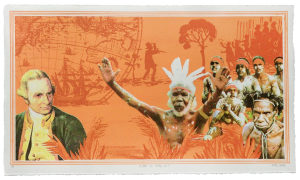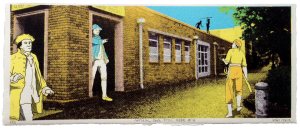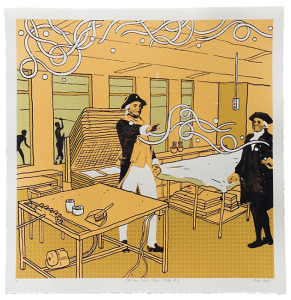
FORGET ME NOT
11 February 2015
Krack!
D.I. Pandjaitan st, Minggiran, Mantrijeron, Yogyakarta
Indonesia
An Other Othering Another
Since the colonization of Australia by the British in 1788, the systematic abuse of Aboriginal people and destruction of their land and culture has had a devastating impact that is still being felt today. In one of the wealthiest nations on the planet, Aboriginal communities are still marginalized and plagued by poverty, violence and poor health.The colonial experience in Indonesia has been no less traumatic, but has been played out in a very different way. Dutch colonisers were finally forced out of Indonesia in 1949 and since then the ‘pribumi’ have had the opportunity to rebuild a culture and a nation according to their own terms.Understandably then, Aboriginal artists in Australia and Indonesia are addressing a very different social and political context, and terms such as ‘post-colonial’ become slippery and unreliable when we attempt to draw parallels between Indonesia and Australia’s colonial experience. It is onto this slippery ground that Prihatmoko Moki has walked in his exhibition ‘Forget me Not’.
In Juli 2015 Moki performed with his band Punkasila in Darwin, a city in the far North of Australia with a large Aboriginal population. On the streets of Darwin he sensed the occasional tension between the indigenous (Aboriginal) and the non-indigenous community and was surprised to find, in discussion with other Aboriginal performers at the festival, that they saw him as one of their ‘mob’. Geographically speaking, coming from Yogyakarta, Moki’s home is indeed far closer to Darwin than Aboriginal communities in the southern states of Australia.Several weeks later Moki began his residency at Megalo, a highly respected printmaking studio in Canberra, Australia’s Capital City. Megalo has a long history of producing socially engaged art and particularly works that supported rights for Indigenous peoples.
Influenced by the work of other Megalo artists who had explored Aboriginal issues, as well as by his recent experience in Darwin, as well as by his own cultural heritage growing up in a country with a colonial history, Moki embarked on a project to explore the issues surrounding colonization and cultural identity.His first series of work, “Captain Cook Still Here” questions whether Australia is actually still a colony. If Indonesia’s colonial period ended at the time of Independence, from Moki’s perspective, wouldn’t that mean Australia is still a colony? (Sure, Australia became a ‘Federation’ in 1901, but the Queen is still on all the currency)
These images were based on the drawing of E Phillips Fox, an australian artist (of British descent) who lived in Australia in the late 19th Century. He was commissioned to ‘The landing of Captain Cook at Botany Bay’ commemorating the British invasion of Australia, in which shadowy and indistinguishable figures of Aboriginal people were placed in the background. From Moki’s wry perspective, this is still the enduring colonial situation. He felt Australian Aboriginal issues are often ‘menutup menutupi’ by Australians. He even got the feeling from his left-leaning friends from the arts community that they seemed wary of discussing the politics of Aboriginal people and the colonial invasion.His research into Phillips Fox led Moki to the work of Tommy McRae, an Aboriginal artist who also worked at the end of the 19th century. McRae prodigiously documented the lives of Aboriginal people, sketching them in a rough way but with great tenderness. His figures convey a very different meaning to Phillips Fox’s aboriginal people. McRae’s figures tell the stories of daily life of Aboriginal people, their daily routines, the struggles they faced, their attitudes to and the injustices of the colonial regime. Moki juxtaposes the self-aggrandizement of the Phillips Fox’s colonial propaganda against the humanity of McRae’s figures, recalibrating the dynamic between the colonizer and the colonized.
The final series of works were printed after Moki returned to Yogya. Back in Java, he was no longer granted the perverse priveledge of being ‘the underdog’. In Indonesia , as a javanese person, Moki is part of the mainstream culture.Since Independence, and particularly during the New Order, the island of Java has benefitted through a regime that exercised authoritarian control over its neighbors in the archipelago, from the colonialist transmigration policies, to the exploitation of resources, to the violent repression of political opposition, to countless murders in the name of a ‘Indonesia Bersatu’, particularly in Timor L’Este, Papua and Aceh.In his final series of images Moki contrasts the political status of Aboriginal Australians with the ongoing struggles of the West Papuan people, whose land and resources are still being exploited by multinational corporations with the collusion of the Indonesian government and military, and who suffer ongoing violations of human rights on an almost daily basis.This body of work raises many questions for us all, no matter what our ethnic or cultural background. Can the injustices of colonisation ever really be compensated? What form would this take? To what extent are we as individuals responsible for these injustices? And what would it take for us to be part of the solution?
Malcolm Smith
Krack!


















